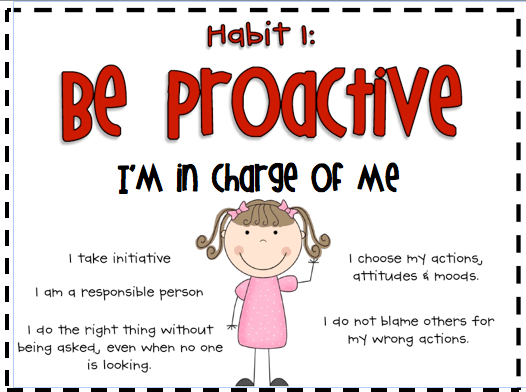Word Of the Week #594: Proactive
December 24, 2015 by Susan Clarke
Proactive – acting in advance to deal with an expected difficulty.
Did you make time to “break a sweat” and exercise last week? How did that make you feel? Were you able to take time to relax? Did you make a connection with any of your social support systems?
This week is the follow up to last week’s Heidi Stevens’ article from the Chicago Tribune titled, “TAMING STRESS” featuring Thea Singer’s “5 things you can do so you will be less reactive to a stressor when one hits. It’s really important to be proactive.”
- Break a sweat: Exercise is a good stressor and it trains your brain to relax.
- Offline friending: Call a pal. Join a book club. Volunteer.
- Skip Ben & Jerry’s: Stress eating makes us feel better, but over time it wears down our ability to keep anxiety at bay. It kicks off a pleasure center, the same way drugs of abuse do. But once it wears off, the cycle starts over and we crave the same food to kick off the center again. This actually raises our stress levels and increases our cortisol levels. I recommend you think of something else that brings you satisfaction that will also kick off the reward center, but that won’t get you into that whole cycle again. Carrots and celery are not necessarily pleasurable. Do something that you enjoy: Take a mindful walk, read a book, jump rope.
- Meditate: We’ve seen a lot of research that shows people who meditate can begin to change not just the physiology of the brain, but the structure of the brain. The brain waves are very different in someone who meditates than in someone who doesn’t. That’s because meditation (also known as mindfulness-based stress reduction) actually creates new neural pathways between the brain’s right and left hemispheres which offers coherence between our brains’s analytical, time-conscious, logical left side and the intuitive, accepting, creative right side. A Psychiatry Research study concludes that participation in mindfulness-based stress reduction is associated with changes in gray matter concentration in brain regions involved in learning and memory processes, emotion regulation, self-referential processing and perspective taking.
- Show compassion: Acceptance of others is particularly helpful in warding off stress. The goal is to alter your perceptions of situations outside of yourself. It’s not about wearing rose-colored glasses, but finding ways to counter negativity. Notice something good that happened to you today and tell someone about it. Do something nice for another person.
Singer ends by saying, “People say, ‘Oh, his is so touchy-feely,’ but there is scientific evidence to back it up. I’m as skeptical as the next guy. But when you look at the science behind it, it’s really inspiring.”
This week’s focus is on being proactive and less reactive. Do you have a backup plan in place if something goes wrong? What activity other than eating brings you pleasure? Have you ever tried meditation? When was the last time you did something nice for someone? Have you ever done a “random act of kindness” to a complete stranger? How did it make you feel?
I LOVE feedback! Join my Facebook community on my FUN-damentals Fan Page.

